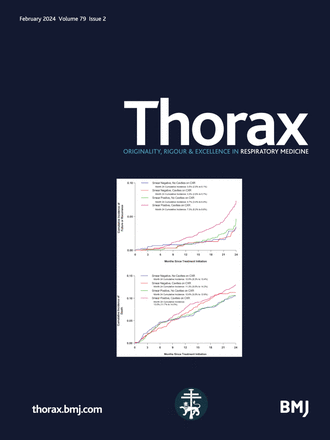Adapting for the future: what can we learn from REMAP-CAP and COVID-19 pandemic trials?
IF 7.7
1区 医学
Q1 RESPIRATORY SYSTEM
引用次数: 0
Abstract
In this issue of Thorax , the REMAP-CAP investigators publish the final results from the COVID-19 Immune Modulation Therapy Domain for COVID-19 of Randomized, Embedded, Multifactorial Adaptive Platform Trial for Community-Acquired Pneumonia (REMAP-CAP).1 REMAP-CAP is an international, adaptive, platform trial focused on hospitalised patients with pneumonia. At the outset of the COVID-19 pandemic in early 2020, REMAP-CAP added a COVID-19 appendix to the existing master protocol to include investigational studies focused on hospitalised patients with COVID-19. The Immune Modulation Therapy Domain for COVID-19 evaluated two interleukin 6 (IL-6) receptor antagonists (tocilizumab and sarilumab), the IL-1 receptor antagonist anakinra and interferon β1a (IFN-β1a) against control (usual care) in an open-label design. The preliminary results from this Domain were previously published in the midst of the COVID-19 pandemic in April 2021.2 It included 353 patients in the tocilizumab arm, 48 in the sarilumab arm and 402 assigned to control. The report demonstrated that the IL-6 receptor antagonists improved both organ support-free days and mortality with posterior probabilities of over 99% compared with control. These results, along with those published by the RECOVERY group, established tocilizumab as a key therapeutic for severe COVID-19, and its use was …适应未来:我们能从REMAP-CAP和COVID-19大流行试验中学到什么?
在这一期的《胸》杂志上,REMAP-CAP研究人员发表了社区获得性肺炎随机、嵌入、多因子适应性平台试验(REMAP-CAP)的COVID-19免疫调节治疗领域的最终结果REMAP-CAP是一项国际性、适应性、平台性试验,主要针对住院肺炎患者。在2020年初COVID-19大流行开始时,REMAP-CAP在现有的总方案中增加了COVID-19附录,以纳入针对COVID-19住院患者的调查研究。COVID-19的免疫调节治疗领域在开放标签设计中评估了两种白细胞介素6 (IL-6)受体拮抗剂(tocilizumab和sarilumab), IL-1受体拮抗剂anakinra和干扰素β1a (IFN-β1a)对对照组(常规护理)的影响。该领域的初步结果先前于2021年4月在COVID-19大流行期间公布。该研究包括353名托珠单抗组患者,48名沙伐单抗组患者和402名对照组患者。报告显示,与对照组相比,IL-6受体拮抗剂改善了器官支持无天数和死亡率,后验概率超过99%。这些结果,以及RECOVERY小组发表的结果,确定了tocilizumab是严重COVID-19的关键治疗方法,其使用是…
本文章由计算机程序翻译,如有差异,请以英文原文为准。
求助全文
约1分钟内获得全文
求助全文
来源期刊

Thorax
医学-呼吸系统
CiteScore
16.10
自引率
2.00%
发文量
197
审稿时长
1 months
期刊介绍:
Thorax stands as one of the premier respiratory medicine journals globally, featuring clinical and experimental research articles spanning respiratory medicine, pediatrics, immunology, pharmacology, pathology, and surgery. The journal's mission is to publish noteworthy advancements in scientific understanding that are poised to influence clinical practice significantly. This encompasses articles delving into basic and translational mechanisms applicable to clinical material, covering areas such as cell and molecular biology, genetics, epidemiology, and immunology.
 求助内容:
求助内容: 应助结果提醒方式:
应助结果提醒方式:


